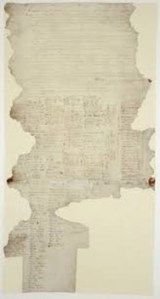
Ana Hamu was a leading member of the Ngāpuhi iwi people in Paihia, Aotearoa, or New Zealand. She married Te Koki, a chief of Te Uri-o-Ngongo Hapū, who died in 1829. They had at least two children named Te Ahara and Rangituke. Both sons sadly died before their father.
Ana had witnessed the arrival of the Anglican Church Missionary Society and gifted the land for its establishment, which she owned. Thus, she was the original patron of the Paihia Mission. The leader was baptised in 1834 by the Reverend Henry Williams with the name ‘Ana.’
Along with other reigning women such as Rangi Topeora, Ana signed the Treaty of Waitangi on 6 February 1840 which established the settlement and governmental framework in Aotearoa. They upheld the powerful Māori forces, mana and tapu, during the process.
In all, thirteen Māori women have been identified as signatories, with more yet to be identified from the five-hundred or more chiefs. These Rangatira, or queens, legitimated the British presence in Aotearoa with hope for a better future.
Ana is thought to have died around the age of sixty and was described as charismatic with a strong personality.
Recommended Reading
Barbara Brookes, A History of New Zealand Women (Wellington: Bridget Williams Books, 2016)
Caren Wickliffe, “Maori Women’s Access to Justice,” Yearbook of New Zealand Jurisprudence 8.2 (2005): 217-263
Kirsten Gabel, Leonie Pihama, Linda Tuhiwai Smith, Joeilee Seed-Pihama, Naomi Simmonds, and Linda Tuhiwai Smith, eds., Mana Wahine Reader: A Collection of Writings 1999-2019, volume II (Hamilton: Te Kotahi Research Institure, 2019)
Ministry for Culture and Heritage. “Ana Hamu,” New Zealand History. Accessed 24th November 2022. https://nzhistory.govt.nz/politics/treaty/signatory/1-61.
